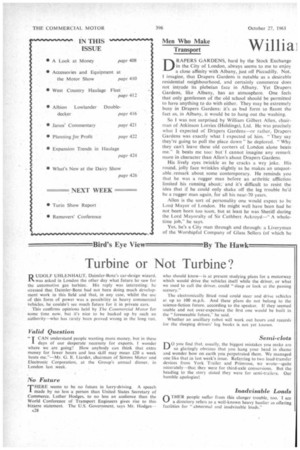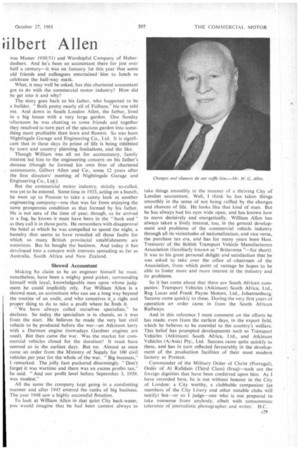Nlen Who Make Transport
Page 30

Page 31

If you've noticed an error in this article please click here to report it so we can fix it.
Williai Wbert Allen
DRAPERS GARDENS, hard by the Stock Exchange in the City of London, always seems to me to enjoy a close affinity with Albany, just off Piccadilly. Not. I imagine. that Drapers Gardens is notable as a desirable residential neighbourhood, and certainly commerce does not intrude its plebeian face in Albany. Yet Drapers Gardens, like Albany, has an atmosphere. One feels that only gentlemen of the old school should be permitted to have anything to do with either. They may be extremely busy in Drapers Gardens: it's as bad form to flaunt the fact as, in Albany, it would be to hang out the washing.
So 1 was not surprised by William Gilbert Allen, chairman of Atkinson Lorries (Holdings), Ltd. He was precisely what I expected of Drapers Gardens—or rather, Drapers Gardens was exactly what I expected of him. "They say they're going to pull the place down" he deplored. "Why they can't leave these old corners of London alone beats me." It beats me too: but-1 cannot imagine any remark more in character than Allen's about Drapers Gardens.
His lively eyes twinkle as he cracks a wry joke. His round, jolly face wrinkles slightly as he makes an unquotable remark about, some contemporary. He reminds you that he was a rugger man before an arthritic affliction limited his running about; and it's difficult to resist the idea that if he could only shake off the leg trouble he'd be a rugger man again, for all his near-70 years.
Allen is the sort of personality one would expect to be Lord Mayor of London. He might well have been had he not been born too soon, but at least he was Sheriff during the Lord Mayoralty of Sir Cuthbert Ackroyd—" A wholetime job." he says.
Yes, he's a City man through and through: a Liveryman of the Worshipful Company of Glass Sellers (of which he was Master 1950/51) and Worshipful Company of Haberdashers. And he's been an accountant there for just over half a century—it was on January 1st this year that some old friends and colleagues entertained him to lunch to celebrate the half-way mark.
What, it may well be asked, has this chartered accountant got to do with the commercial motor industry? How did he get into it and why?
The story goes back to his father, who happened to be a builder. "Built pretty nearly all of Fulham,his son told me. And down in South London Allen, the father, lived in a big house with a very large garden. One Sunday 'afternoon he was chatting to some friends and together they resolved to turn part of the spacious garden into something more profitable than lawn and flowers. So was born Nightingale Garage and Engineering Co., Ltd. It is significant that in these days its prime of life is being inhibited by town and country planning limitations, and the like.
Though William was all set for accountancy, family interest led him to the engineering concern on his father's decease (though he formed his own firm of chartered accountants, Gilbert Allen and Co., some 12 years after the first directors' meeting of Nightingale Garage and Engineering Co., Ltd.).
But the commercial motor industry, strictly so-called, was yet to be entered. Some time in 1933, acting on a hunch, he went up to Preston. to take a canny look at another engineering company—one that was far from enjoying the same prosperous condition as that formed by his father. He is not sure of the time of year, though, as he arrived in a fog, he knows it must have been in the "back end as they call it in those parts. He remembers with disapproval the hotel at which he was compelled to spend the night, a hostelry that seems to have revealed all those faults for which so many British provincial establishments are notorious. But he bought the business. And today it has developed into a concern with interests spreading as far as Australia, South Africa and New Zealand.
Shrewd Accountant
Making ho claim to be an engineer himself he must, nonetheless, have been a mighty good picker, surrounding himself with loyal, knowledgeable men upon whose judgment he could implicitly rely. For William Allen is a shrewd man, an accountant who can see a long way beyond the routine of an audit, and who conceives it a right and proper thing to do to take a profit where he finds it.
"We have always called ourselves specialists," he declares. So today the specialism is in chassis, as it was from the start. He believes he made the very last civil vehicle to be produced before the war—an Atkinson lorry with a Dorman engine (nowadays Gardner engines are used). But then came the war. Was the market for commercial vehicles closed for the duration? It must have seemed so in the earliest days. But no. Almost at once came an order from the Ministry of Supply for 100 civil vehicles per year for the whole of the war. "Big business," I remarked. The jolly face puckered disarmingly. "Don't forget it was wartime and there was an excess profits tax," he said. "And our profit level before September 3, 1939, was modest."
All the same the company kept going in a comforting manner and after 1945 entered the ranks of big business. The year 1948 saw a highly successful flotation.
To look at William Allen in that quiet City back-water, you would imagine that he had been content always to take things smoothly in the manner of a thriving City of London accountant. Well, I think he has taken things smoothly in the sense of not being ruffled by the changes and chances of life. He looks like that kind of man. But he has always had his eyes wide open, and has known how to move decisively and energetically. William Allen has always taken a lively interest, too, in the general development and problems of the commercial vehicle industry through all its vicissitudes of nationalization, and vice versa, the purchase tax era, and has for many years been Hon. Treasurer of the British Transport Vehicle Manufacturers Association (familiarly known at " Britavema "—for short). It was to his great personal delight and satisfaction that he was asked to take over the office of -chairman of the Association, from which point of vantage he hopes to be able to foster more and more interest in the industry and its problems.
So it has come about that there are South African companies: Transport Vehicles (Atkinson) South Africa, Ltd., Reg Lucas and Frank Payne Motors, Ltd., Johannesburg. Success came quickly; to these. During the very first years of operation an order came in from the South African Railways.
And in this reference I must comment on the efforts he has made. even from the earliest days, in the export field, which he believes to be essential to the country's welfare. This belief has prompted developments such as Transport Vehicles (Atkinson) South Africa, Ltd., and Atkinson Vehicles (A/Asia) Pty., Ltd. Success came quite quickly to these, and has in turn reflected favourably in the development of the production facilities of their most modern factory at Preston.
Commander of the Military Order of Christ (Portugal), Order of Al Rafidain (Third Class) (Iraq)—such are the foreign dignities that have been conferred upon him. As I have recorded here, he is not without honour in the City of London: a City worthy, a clubbable companion (as members of the City Livery and other notable clubs will testify) but—or so I judge—one who is not prepared to take nonsense from anybody, albeit with consummate tolerance of journalistic photographer and writer. H.C.




















































































































